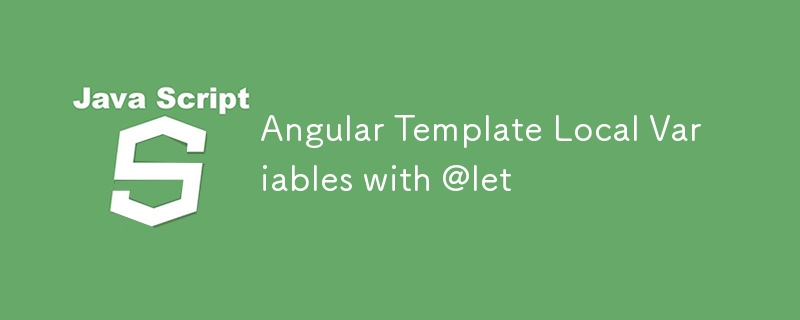Home >Web Front-end >JS Tutorial >Angular Template Local Variables with @let
Angular Template Local Variables with @let
- WBOYWBOYWBOYWBOYWBOYWBOYWBOYWBOYWBOYWBOYWBOYWBOYWBOriginal
- 2024-07-17 21:59:26712browse

Key takeaways
- Syntax: let variableName = expression;
- Scope: The variable is only available within the HTML element or block where it's declared.
-
Common scenarios:
- Reduce repetition of complex expressions.
- Better handle type narrowing.
- Define complex styling options.
- Improve template readability.
Best practices
- Use let to minimize repetition.
- Use let to improve type narrowing.
- Use let to define complex styling options.
- Carefully consider using let for calculations or business rules.
Thoughts
The let declaration is a welcome addition that simplifies variable management in templates and improves code readability. It's particularly useful for reducing repetition and defining complex styling options. However, it's important to carefully consider using let for calculations or business rules, as it could make the code harder to maintain.
Additional resources
- Official Angular documentation on the let declaration: https://blog.angular.dev/introducing-let-in-angular-686f9f383f0f?gi=63f5b3e52822
How do you plan to use the let declaration in your Angular projects?
Leave a comment below and share your thoughts!
The above is the detailed content of Angular Template Local Variables with @let. For more information, please follow other related articles on the PHP Chinese website!
Statement:
The content of this article is voluntarily contributed by netizens, and the copyright belongs to the original author. This site does not assume corresponding legal responsibility. If you find any content suspected of plagiarism or infringement, please contact admin@php.cn
Previous article:Oh CommonJS! Why are you mESMing with me?! Reasons to ditch CommonJSNext article:Oh CommonJS! Why are you mESMing with me?! Reasons to ditch CommonJS
Related articles
See more- An in-depth analysis of the Bootstrap list group component
- Detailed explanation of JavaScript function currying
- Complete example of JS password generation and strength detection (with demo source code download)
- Angularjs integrates WeChat UI (weui)
- How to quickly switch between Traditional Chinese and Simplified Chinese with JavaScript and the trick for websites to support switching between Simplified and Traditional Chinese_javascript skills

